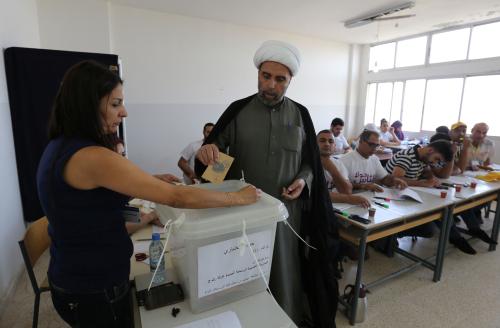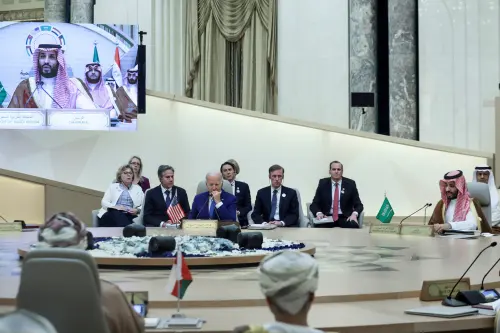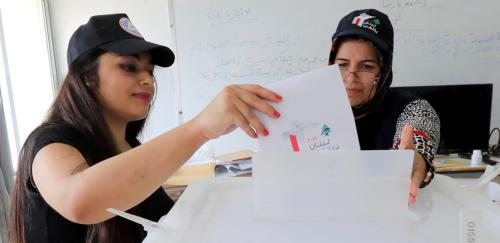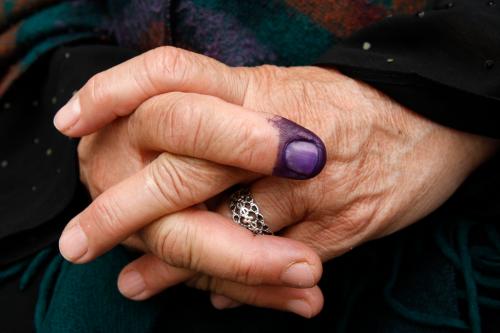Last week, Tamara Cofman Wittes co-chaired an international election observation mission in Lebanon for the National Democratic Institute (she serves on NDI’s board, but the views laid out below are her own, not NDI’s).
International election observation is a common practice amongst democratic states, allowing them to support and learn from one another’s electoral exercises—governments that reject international observers usually reject other core democratic norms as well. Electoral observation missions operate according to an international code of conduct and core international human rights treaties. NDI’s mission issued a preliminary statement the day after polls closed, but NDI will continue to follow the process and will issue a final report later this year.
As a Middle East policy analyst, observing Lebanon’s parliamentary elections gave me a worm’s eye view of the contending forces seeking to shape politics not only in Lebanon, but across the Arab world. Tiny Lebanon has been in the eye of the storm over the past decade, absorbing over one million Syrian refugees (adding 25 percent to its population) and seeing its own political system buffeted by competition between Saudi Arabia (the patron of Saad Hariri’s Future Movement) and Iran (the patron of Lebanon’s Shiite militia, Hezbollah). Here are three insights I took away from my time in Lebanon, and from conversations there with Lebanese voters, analysts, politicians, and activists.
1Holding relatively peaceful elections in the face of Lebanon’s stressful circumstances is itself a small triumph.
Some might say this statement reflects a “soft bigotry of low expectations” for the Arab world. But in the context of recent history, that’s not so. After the people-power uprisings of the Arab Spring were hijacked by violence in Syria, Libya, Bahrain, and Yemen; after Egypt’s popular overthrow of the Mubarak regime was hijacked first by an elected president who betrayed democratic principles, then by a military coup and a renewed dictatorship; after monarchs and militias have dominated and driven the region’s trajectory for more than half a decade—after all this, a relatively peaceful and relatively open election is truly worth celebrating.
Tunisia held municipal elections on the same day as Lebanon’s parliamentary balloting, and Iraq’s parliamentary elections came just a week later. Amidst all the violence and zero-sum arguments, these three electoral exercises offer the Arab world a fragile but important counterpoint—there is another way. Moreover, if Lebanon and Iraq can pull off free elections under such trying circumstances, it’s harder for strongmen in other states to argue that they can’t afford the risk to stability of allowing their own peoples a choice in who governs them.
Lebanon’s successful electoral exercise also reflects the fact that, despite aggressive rhetoric, neither local nor regional powers want to escalate their current conflicts. Last fall, Saudi Arabia’s brash crown prince tried to force a confrontation with Iran and Hezbollah by kidnapping Lebanon’s Sunni prime minister and coercing his resignation on live television. The gambit failed, and Hariri returned to his office in Beirut (albeit weakened). Today, the Kingdom is in wait-and-see mode as Hariri works to form his next government—but they are not spoiling for a fight.
The relatively peaceful atmosphere is also a reflection of the effectiveness and professionalism of the Lebanese security forces. The Lebanese Armed Forces (LAF) is the most trusted national institution in a country where most public offices are distributed along the lines of religious sect and patronage networks. When political party supporters kicked off clashes while I was in-country, the LAF swiftly separated the combatants and shut down the violence. Within polling places, internal security forces (the national police) secured election materials and managed the flow of voters with good humor.
2The narrative of most Western media reports (Reuters, New York Times, and Washington Post, for instance), that Hezbollah won these elections, is not quite right. Yes, Hezbollah and its ally Amal increased their seat total by two. Yes, Hariri’s Future Movement lost one-third of its seats. But neither of these outcomes really alter the balance of power in Beirut, and the likely result is another government headed by Hariri and including Hezbollah.
It’s more accurate to say that Hezbollah “won” the game of Lebanese politics (for now, because in Lebanon no victory is ever final), not on Election Day but in October 2016, when it worked with Hariri to end the stalemate that had left Lebanon with no president for two-and-a-half years. That compromise—in which Hezbollah ally Michael Aoun became president and Hariri reclaimed the prime ministry—ended a period marked by bombings and armed clashes between political factions allied with and opposed to Syria’s Bashar al-Assad, a period in which Hezbollah had demonstrated its willingness to use force of arms to overturn political outcomes it disliked, and in which Hariri’s patron in Lebanon—the Kingdom of Saudi Arabia—largely left the playing field, reducing aid to the government and to Hariri’s Future Movement. As was true in October 2016, so now: Hariri’s leadership of Lebanon’s government depends on Hezbollah’s acquiescence; and Hezbollah continues to wield a veto over government decisions it does not see as in its interests.
The relative stability of Lebanon in the years since that deal was consummated has led citizens to demand more effective governance, as evidenced in massive public protests over garbage disposal and the emergence of new citizen movements and independent politicians campaigning against corruption. As this bottom-up pressure mounted, all the traditional political movements had an interest in elections to renew and legitimate their leadership. They wrote a new electoral law that was like an elephant designed by committee: a hybrid of proportional representation, preferential voting, districts of varying size, and Lebanon’s unique confessional allocation of parliamentary seats. The new law was designed to enshrine the power of established parties, and it largely worked as planned. Thus, the post-election configuration of Lebanese politics, at least with respect to Hezbollah/Iran vs Hariri/Saudi, is not really meaningfully different from the pre-election configuration.
3The process that led to these elections, though, makes clear that the balloting was not a mere procedural exercise. Regardless of their political preferences, voters were highly focused on corruption, jobs, and health care. Even traditional parties had to address these practical concerns over government effectiveness and make new appeals to attract the nearly 800,000 new voters who have come of age since Lebanon’s last parliamentary balloting nine years ago. And all of the parties, including Hezbollah, faced trouble getting their loyal voters to the polls—turnout in these elections was approximately 49 percent, a meaningful drop from the 2009 level of 54 percent. The escalating demands of Lebanon’s citizens for effective government services and the rise of a newly energized civil society led to the emergence of an unprecedented number of independent candidates, who eschewed affiliation with patronage-based, confessional movements and in some places challenged them directly. Although more than 70 independent candidates made it onto ballots, the barriers posed by the electoral system and the high cost of campaigning meant that only one—a prominent female journalist from Beirut—won a seat in the parliament.
New movements in any democracy take time to see electoral gains—the more so in a system as clientelistic and fractured as Lebanon’s. While the United States has for years hoped to see alternative Shia movements to Hezbollah and Amal emerge in Lebanon, such efforts remain marginal and face relentless intimidation and harassment from Hezbollah. Still and all, the emergence of trans-confessional, independent politicians and the continued pressure for improved governance mean that there is hope for change in Lebanon. The United States currently provides $80 million in economic aid and $120 million in military aid to the country, with funds focused on the army, education, and governance. Developments over the nine years since the last parliamentary elections strongly suggest that change in Lebanese politics won’t come from above but rather from the grassroots. The lesson for American policy makers is to stay in the game.
The Brookings Institution is committed to quality, independence, and impact.
We are supported by a diverse array of funders. In line with our values and policies, each Brookings publication represents the sole views of its author(s).






Commentary
Three observations after observing the Lebanese elections
May 17, 2018